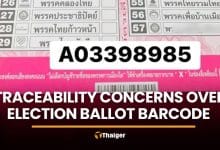Thai MP accused of insulting the King of Thailand

Padipat Santipada, a member of the Move Forward Party (MFP), is facing a lese majeste charge in Thailand after being accused of insulting the king in a political speech delivered earlier this month. The charge against Padipat relates to Section 112 of the Thai Criminal Code.
Srisuwan Janya, secretary-general of the Association for the Protection of the Constitution, filed a complaint with the Election Commission (EC) yesterday and requested an investigation into a pre-election speech given by Padipat. The MFP MP was speaking at a campaign rally in Phitsanulok, where he is standing for election on March 5, reported Bangkok Post.
During the rally, Padipat allegedly claimed that some royally initiated projects were tainted by corruption. These comments have been interpreted as an insult to the king by Srisuwan and others, prompting the lese majeste charge. Srisuwan said…
“His mention of the graft in the speech was defamatory to the monarchy. It is common knowledge that projects royally initiated by His Majesty King Bhumibol Adulyadej The Great and His Majesty the King, which number over 4,700, are intended for the well-being of the people.
“Canvassing for votes through smear campaigns or acts of defamation violates the EC regulations and the organic laws on the election of MPs and political parties. The organic law on the election of MPs forbids any party or individual from disseminating false information to voters.
“In the organic law on political parties, deceiving voters with false information by a party executive may be grounds for dissolving the respective party.”
He added several parts of Padipat’s speech on March 5 were inappropriate for use in a campaign rally.
Srisuwan added that he has presented a video clip of the MP’s campaign speech as evidence to the EC.
Padipat is not the only MP to face a lese majeste charge. Thanathorn Juangroongruangkit, a former MP and leader of the now-dissolved Future Forward Party was accused of defaming the Thai royal family.
In December 2019, Thanathorn was accused of violating the Computer Crimes Act and Section 112 for comments he made during a public speech. Thanathorn had criticized the government’s handling of a controversial investment by King Maha Vajiralongkorn, prompting the charges.
Pannika Wanich, a former MP for the same party, also faced lese majeste charges in 2019. Wanich was accused of making comments on social media that were critical of the monarchy. She denied the allegations, but the case underscored the extent to which discussions of the monarchy are restricted in Thailand.
Other politicians who have faced lese majeste charges include Somyot Pruksakasemsuk, a labour activist and former editor of a magazine that was critical of the monarchy. Somyot was sentenced to 10 years in prison in 2013, but his sentence was later reduced to seven years on appeal.
The use of lese majeste charges in Thailand has been controversial, with human rights groups criticizing the law as a means of suppressing political dissent. Despite calls for reform, the law remains in place, and allegations of violations continue to be levelled against politicians, activists, and others who speak out against the monarchy.
Padipat’s case is likely to draw further attention to the issue of lese majeste in Thailand, which has faced criticism from human rights organizations for its harsh enforcement of the law. The MFP, which is seen as a progressive political force in the country, has previously called for the repeal of Section 112, arguing that it stifles free speech and democratic debate.
The outcome of the case against Padipat remains to be seen, but it is likely to spark debate and controversy in Thailand as the country prepares for its next general election.
Latest Thailand News
Follow The Thaiger on Google News:


























